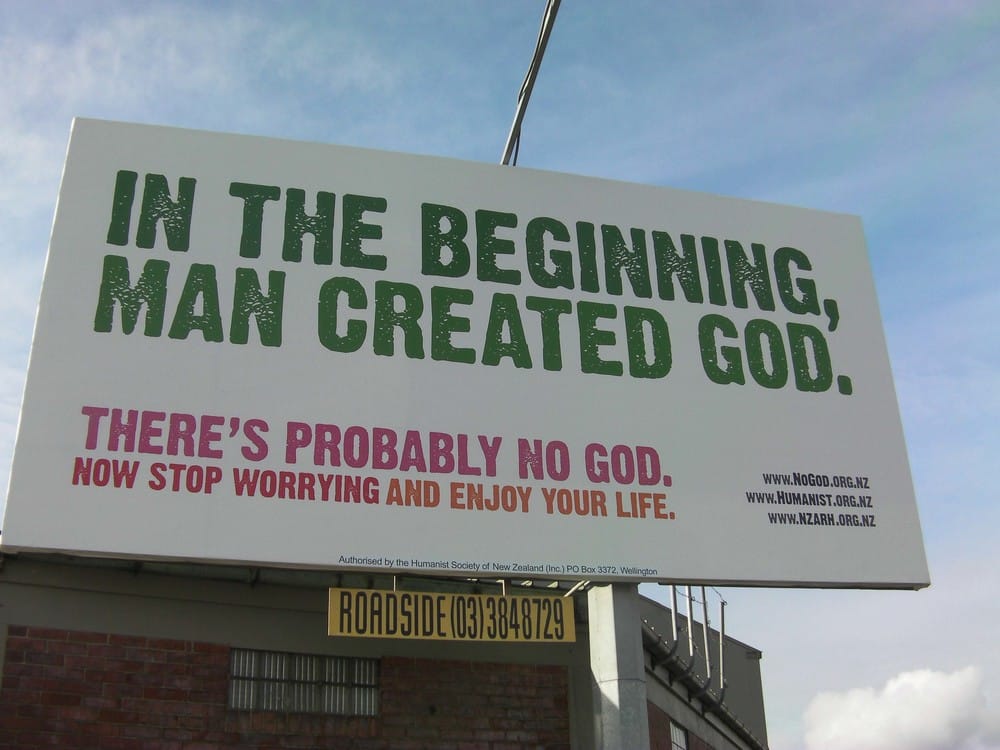Religion for Atheists
Rory Fenton shares him impressions from the first meeting of The Sunday Assembly, London’s new ‘atheist church’

"An atheist church”
I repeated the sentence a few times to myself while making my way along Islington’s St Paul’s road on Sunday morning. St Paul’s famous road to Damascus led him to found Christian communities but this St Paul’s road was taking me to a whole new concept of human community: an atheist church. As in, a church for atheists. Could this work? Did it even make any sense? I wasn’t sure. But I was keen to find out.
I was on my way to thefirst ever meeting of The Sunday Assembly, the brainchild of comedians Sanderson Jones and Pippa Evans. Formed under the motto of “live better, help often, wonder more”, the monthly meetings aim, in the words of Jones, to give London atheists “all the things that are good about bringing a community together and make us better people, just without God being involved”. The group have no problem with borrowing directly from religion, the services themselves are held in an old, deconsecrated church.
But Sanderson and Pippa aren’t the first people to have this idea, although they seem to be the first to put it into practice in London. The thought of creating a religion-like community of atheists, agnostics, humanists etc. has been a hot topic of discussion since Alain de Button published his book Religion for Atheists almost exactly a year ago. De Button argued that rather than shun everything with a “religion” label, non-believers should look at where religion did get it right, including in building community, providing perspective, realising our human flaws and giving us a focus for art and architecture. It is the first of these, building community, that the Sunday Assembly chiefly targets.
The idea is pretty controversial with many atheists. Some can’t see there being anything worth learning from religion. After all, if it’s based on a false premise, how could a religion get anything right? And doesn’t the idea of an atheist church open up the non-religious to the age-old accusation of “you’re really just another type of religion”? I decided to withhold my judgment and see for myself what this type of atheist community would look like. So up St Paul’s Road I went…
The building itself was indeed a stereotypical Church of England stone house of worship, now used as a Steiner school. Having grown up Catholic I’m pretty used to church buildings but many atheists, especially those from religious but non-Christian backgrounds, may find this off-putting. But I quickly stopped thinking about that, because the big news of this Sunday Assembly became immediately clear as I walked in – the idea is incredibly popular. With five minutes to go before show time, the place was completely packed with about 200 people. I was just about able to grab a child’s stool at the back (as in a stool meant for children, I wouldn’t steal from a child; not unless they had it coming) and a minute later heard half panicked, half jubilant commands to open up the choir balcony to accommodate even more people. By the time the meeting started, there were still a good 30 people either sat on the floor or standing at the sides.
So it seemed I wasn’t the only one curious to see this idea in action. The service itself lasted just over an hour and was, again, very much influenced by Christian services. It had much of the format of an evangelical service with sermons sandwiched between hymns. Yep – sermons and hymns. So what is an atheist sermon? Well it’s very funny, or at least these ones were. Since the Sunday Assembly’s founders are comedians, their sermons felt very much like a stand-up gig. The event is compered by the messianic-ly bearded Sanderson Jones who introduced the whole idea behind the project and was generally very funny. There was also a guest speaker, this week’s being children’s author Andy Stanton. I can’t say I got too much from Andy’s speech. There was a general atmosphere in the church of the organisers being very keen not to seem “preachy” but what that meant with Andy was that instead of giving his words of wisdom on “beginnings”, supposedly reflecting on how he became an author, he just made a lot of self-deprecating jokes interspersed with pauses that felt a bit too long to be intentional. That said, the idea of an atheist (or perhaps more precisely a humanist) ‘sermon’ is far from a crazy one. Humanists admire great scientists, philosophers and poets and a sermon based around their works and a secular theme like ‘wonder’ or ‘relationships’ is perfectly reasonable, in the understanding that these are just words of advice intended to provoke personal reflection. Pippa’s stand-up style talk about not sweating the little stuff was a nice example of this. So atheist sermons get a thumbs up.
It had much of the format of an evangelical service with sermons sandwiched between hymns. Yep – sermons and hymns.
And an atheist hymn? This Sunday’s hymns were ‘Don’t Look Back in Anger’ and ‘Build Me Up Buttercup’. They even had a live band and lyrics on a projector screen. Hey, I’m cool with this too. As a Catholic I played in a church group and quite miss this. Songs are always full of messages about life, why not enjoy them together? Convincing a room of Londoners who don’t know each other to sing together is a whole other story. I don’t reckon anymore than 20% of us had the gall to join in, but maybe that’ll improve with time. I like this idea – atheist hymns also get a thumbs up.
And then came the prayer stuff. OK not actual prayers, since no deity was invoked, but some very prayery stuff. A ‘moment of silent reflection’ was encouraged which made me, and I imagine others, feel pretty uncomfortable. Not so much because I didn’t like the reflection thing, mind. When my family prays before meals I don’t join in but I do try to remind myself that I’m pretty lucky to have food and should be glad of this fact, even if I’ve no god to thank. So I do see how atheists can use moments of quiet reflection in their lives. But to see this form a part of the atheist church service made me pretty uncomfortable, quite probably because it just felt so religious. Perhaps I should just get over this, but the Sunday Assembly need to remember that many attendees may have had uncomfortable religious experience in the past, making organized silence challenging.
But the silent reflection was a little more prayery than mere silence. Being January, the service’s theme was around beginning new things and resolutions. In our silence, we were encouraged to think about something we want to change in our lives and how great that would feel to achieve. We were told that scientists have shown that just by saying something out loud, our brains will believe it is true. Now I am all for encouraging people to achieve their goals but I feel the organisers were stepping out of their remit and the spirit of rationalism here. The idea that success can be aided by imagining how great it would be to lose those pounds, get that job or kiss that girl is only one philosophy and not only is it not supported by evidence, the evidence actively opposes it. This unscientific approach was further highlighted by choosing a Steiner school as the host venue for the meeting. This was not a coincidence. I raised this with Sanderson Jones afterwards who said that a Steiner school was what they had initially sought, the fact that this one was in an old church building was just a happy coincidence. This is no small matter. Steiner schools promote homeopathy among their pupils and do not provide inoculations, which puts children’s health at great risk.
Then we came slightly closer to a proper prayer. Sanderson got us to shout “Life is good” and “Life is great”, again with the reasoning that simply saying this wouldhave a positive impact on us. But ignoring the lack of psychological evidence here, I’m not sure I agree with this. You see, life isn’t necessarily good. Really shit things can happen and we need to see them for that. If atheists are to adopt the stance that “life is good” then we make ourselves no better than those who slavishly repeat “God is good” as a hurricane bears down on them. An important part of maturity, I feel, is accepting that shit happens so make the most of the good stuff. Blind “hope” is simply an atheist’s version of blind faith and equally flawed. Bah humbug.
Should interest in pseudo-science continue, The Sunday Asssembly will not find me or many other rationalists in its numbers. However, I have hope. This was just the first session of what is hoped to become a permanent monthly fixture. There is room for discussion and change, as the organizers themselves stressed throughout. Being comedians, the organisers have done a great job of creating a fun, lively atmosphere which will be a big selling point for the services. But no one could expect them to be ‘all things to all men’. They may not know about the research behind so-called ‘self help’ or of the beliefs of Steiners. As they gather momentum and interest and take on more voices, there is no reason to think that the Assembly can’t change. Here’s hoping they will.
Leaving the service, I, and most of the godless congregation, were struck by a bolt of irony as a real, bona fide Christian church service was going on in the hall next door from an African evangelical congregation. So how different was our service to this, the ‘real thing’? And what is it that will make those who actively oppose one join in the other? The atheist church needs to provide the good stuff of regular church with none of the bad stuff of irrational belief or evangelical zeal. My verdict from the first day? It’s on the right track. I and most attendees left the service feeling a little happier about life – we certainly had a good time. The idea of sermons is a positive one, but may need more focus on a message than making people laugh. Hymns were fun and the reflection time may have a purpose but they should be sensitive to those who may be made uncomfortable by the religious overtones. The ‘self help’ style stuff should be toned down and not central to the service. The connection with the Steiner school should be seriously questioned. But I do feel that The Sunday Assembly could well be the start of a great thing. I left the place like most did, feeling like I’d enjoyed myself and encouraged to be around like minded people interested in exploring and celebrating life. Sanderson and Pippa make for a great team – what they need are more voices on board. Sciencey people, arty people, philosophy-y people – people to give the church a wider vision and a wider appeal. There are improvements to be made but I’d like to be a part of those improvements. London now has its first atheist church. In time, I think I might just be a convert.









